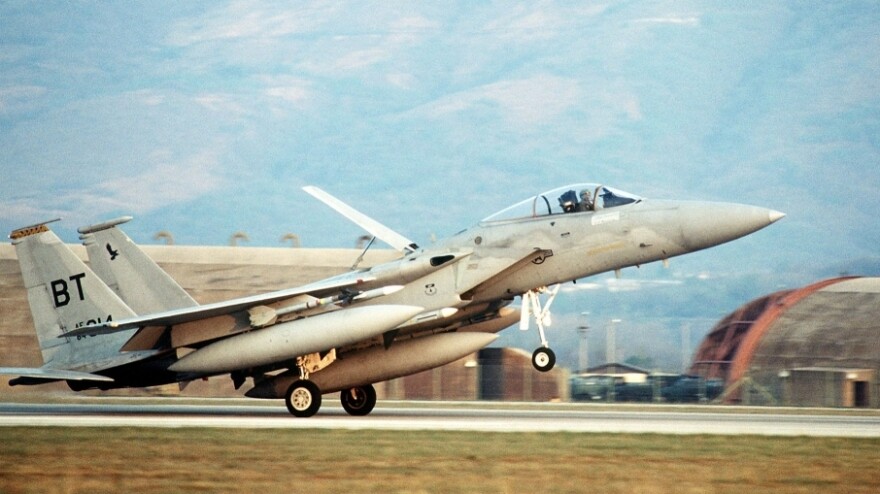During the fighting this week in Libya, government forces have attacked the opposition in the eastern part of the country with aircraft. And the rebels have asked the international community to consider possible military action.
The most talked about option is a no-fly zone — to keep Libyan military aircraft out of the skies. No-fly zones have been enforced before, but they are a military and diplomatic challenge.
Retired Navy Capt. Tom Parker knows a few things about no-fly zones.
He took part in one, flying a Hawkeye surveillance plane over the Balkans back in the mid-1990s to prevent Serbian forces from targeting civilians. And he says it could work in Libya.
"It limits the freedom of action of Col. Gadhafi and his government," Parker says. "And also it puts enormous pressure on him because now you've got Big Brother there, breathing over his shoulder, garlic breath on his neck."
But Parker says breathing down Libyan leader Moammar Gadhafi's neck would require large numbers of American aircraft — from fighter jets to surveillance planes. There's a U.S. aircraft carrier in the region, with dozens of warplanes — but not enough crew for 24-hour operations.
"The big limiting factor is the flight deck crew," he says. "If you're doing full-time, round-the-clock operations, they'll run out of gas. That is, they'll get physically exhausted and it becomes unsafe after about a day."
'A Lot Of Loose Talk'
Retired Air Force Lt. Gen. Dave Deptula was the principal attack planner for the 1991 Gulf War. A few years later, he flew an F-15 fighter over Iraq — enforcing a no-fly zone.
"This is not a simple operation," he says.
Deptula says that before the United States deploys warplanes, it needs to get backing from other nations — at the United Nations, for example. And, he says, the Obama administration must answer a basic question: What are you trying to do?
"Do you want to enforce a humanitarian effort? Do you want to assist the rebels in overthrowing Gadhafi? Do you want to instigate regime change on your own?"
Then there are practical military considerations.
Gadhafi's radar and missile threat would have to be eliminated before putting American pilots in the skies over Libya. That reality prompted Defense Secretary Robert Gates to chide those calling for a no-fly zone.
"There's a lot of, frankly, loose talk about some of these military options, and let's just call a spade a spade," he told the House Appropriations Committee on Wednesday.
A no-fly zone is essentially an American invasion from the sky, Gates told the lawmakers.
"A no-fly zone begins with an attack on Libya — to destroy the air defenses. That's the way you do a no-fly zone. And then you can fly planes around the country and not worry about our guys being shot down," he said.
Concerns About The Impact On Afghanistan
Another issue: a large number of Air Force refueling tankers would be needed so warplanes could fuel up in the sky and continue their mission.
"If you're going to be flying fighter aircraft down, you're going to need lots of tanker assets to fly from Italy down to the vicinity of Libya," says Parker, who now teaches at the Naval War College.
But refueling tankers are a key tool in Afghanistan. Gates worries that a long operation in Libya could hurt the Afghanistan mission.
"If we move additional assets, what are the consequences of that for Afghanistan, for the Persian Gulf? Those are some of the effects that we have to think about," Gates said. "We also have to think about, frankly, the use of the U.S. military in another country in the Middle East."
But Secretary of State Hillary Clinton says questions about the difficulty of setting up a no-fly zone have been heard before — 15 years ago in the Balkans.
"Eventually, it was determined that it was in the interests of the peace and stability of the region," she said.
Still, Clinton said, the United States is a long way from deciding what to do.
Copyright 2020 NPR. To see more, visit https://www.npr.org. 9(MDAxNDQ2NDAxMDEyNzU2NzM2ODA3ZGI1ZA001))




